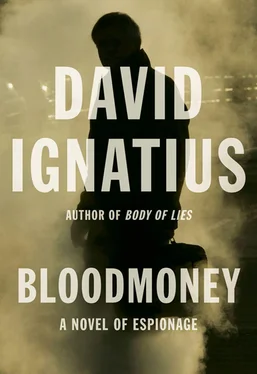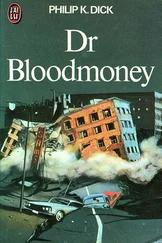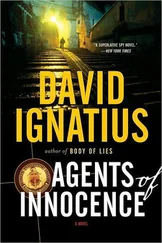David Ignatius - Bloodmoney
Здесь есть возможность читать онлайн «David Ignatius - Bloodmoney» весь текст электронной книги совершенно бесплатно (целиком полную версию без сокращений). В некоторых случаях можно слушать аудио, скачать через торрент в формате fb2 и присутствует краткое содержание. Жанр: Шпионский детектив, на английском языке. Описание произведения, (предисловие) а так же отзывы посетителей доступны на портале библиотеки ЛибКат.
- Название:Bloodmoney
- Автор:
- Жанр:
- Год:неизвестен
- ISBN:нет данных
- Рейтинг книги:4 / 5. Голосов: 1
-
Избранное:Добавить в избранное
- Отзывы:
-
Ваша оценка:
- 80
- 1
- 2
- 3
- 4
- 5
Bloodmoney: краткое содержание, описание и аннотация
Предлагаем к чтению аннотацию, описание, краткое содержание или предисловие (зависит от того, что написал сам автор книги «Bloodmoney»). Если вы не нашли необходимую информацию о книге — напишите в комментариях, мы постараемся отыскать её.
Bloodmoney — читать онлайн бесплатно полную книгу (весь текст) целиком
Ниже представлен текст книги, разбитый по страницам. Система сохранения места последней прочитанной страницы, позволяет с удобством читать онлайн бесплатно книгу «Bloodmoney», без необходимости каждый раз заново искать на чём Вы остановились. Поставьте закладку, и сможете в любой момент перейти на страницу, на которой закончили чтение.
Интервал:
Закладка:
“He was the spotter,” Marx said with a wink. “That’s what we call them.”
“Okay, so he called one day and said he had a friend in the government named Cronin who was a big deal, and that we should meet the next time I was in the States. And I thought, sure, great. A lot of people in finance were helping out after 9/11 and I thought I should, too. So I telephoned the number he gave me for Cronin and left a message saying that I would be in New York in a week. Cronin called back the next day. He suggested we meet at the Athenian Club, where I guess he was a member.”
Marx smiled at the thought of such a rendezvous. She had visited the club herself, with one of her professors, when she was an undergraduate at Princeton. It was a handsome beaux arts front on West Forty-Third Street, with a white marble facade, elaborate carvings and moldings and a club flag flapping in the breeze next to Old Glory.
“A perfect place to take an ex-professor like you,” she said. “Old paintings on the wall, books in the library shelves, rooms with bathtubs and no showers: old school. Nothing bad could happen there.”
“Cronin was waiting upstairs, sitting in a leather chair and sipping a martini as if he owned the place. He rose as soon as I entered the room. He obviously had a picture of what I looked like. The waiter arrived, and I thought, what the hell, do the James Bond thing, so I ordered a martini, too. I took a sip, we talked for a while. He told me about how some famous names in finance were helping: This man got them a new building on Fifth Avenue, pronto, after the New York station went down on 9/11. That one used his company as a front to catch a terrorist from Pakistan. All very impressive.”
“So the hook was in.”
“Definitely. After a while, he popped the question: ‘How would you like to help your country in a time of need?’”
“We call that ‘the pitch.’ What did you say?”
“I told him of course I would. I had decided that I would say yes on the flight over. I asked him what it would involve, and he said little things, until we got to know each other better. And that’s all it was, the first few years. Little things: Can you tell us about your foreign contacts? Can you help us facilitate a payment overseas? Can we use one of your houses as a meeting place? Easy stuff.”
“That’s ‘development,’ by the way, the part where we watch you and see how you’re doing. When did it get nasty?”
Perkins looked down at his plate. As much as he had wanted to tell the story, it got harder at this point.
“They caught me cheating. That was the start. I had a man inside the Bank of England. He was giving me information about the Monetary Policy Committee. I was paying him five hundred thousand dollars a year, to a bank in the Cayman Islands, and making twenty times that off his information. But the transfers got picked up by the U.S. money-laundering snoops, and my guy panicked. He thought he had been caught by the Inland Revenue for tax evasion.”
“So you asked for help?”
“Exactly. I told Cronin about it. I didn’t exactly ask him to fix it, but he knew that’s what I wanted. Case went away. Poof. No more questions.”
“And you were relieved. And you thought, these intelligence friends of mine are pretty helpful.”
“Just so. But then it turned. The markets began to go screwy, and I was in trouble. Like a lot of people, I had bought fistfuls of credit swaps that I thought could never go bad, I mean, how’s Morgan Stanley ever going to go bust, right? But everything turned to shit in a couple of weeks, and I was desperate to raise cash.”
“And you got a call from Cronin?”
“You know the script. Cronin called and said he had a great idea. He’d heard I was in a little trouble and he knew the perfect way out. We should do what I had been doing with my guy in the Bank of England, but on a global scale. He would supply the inside information, I would trade on it and we would split the profits.”
“‘The system.’”
Perkins nodded. “And now you’re part of it. That’s my fault.”
Marx shook her head. “I’m a big girl. I know what I’m doing. And this guy Anthony Cronin isn’t ten feet tall. Believe me. If you really want a way out, you’ll find one.”
Perkins wanted to order cheese, but she said no, at the end of so much heavy talk she wanted something sweet. Dolce, she said, but not dolcissime. He ordered panna cotta, a delicate dessert of cooked cream, served with grappa and baked nespole, an Italian fruit that looked like an apricot and had a taste between sweet and tart.
“Tell me about Beirut,” he said, as they were drinking the last of the dessert wine. “You said that you worked there, but you didn’t tell me what you did.”
“Of course I didn’t. Don’t be silly. That’s a no-no.”
“I don’t mean the details, just generically, sort of. Make it up, as if it were a spy novel.”
“Okay. Imagine an international civil servant. She works for UNESCO in Paris, at least that’s what her card says. She travels regularly to Beirut. She stays at the Phoenicia, on the corniche. She spends her days at UNESCO’s office out near the airport, but she has free time at night and on the weekends. She goes to restaurants. She has a chalet at the beach. She’s always meeting people. Sometimes they’re her agents. Sometimes they work for Lebanese intelligence, or for the Syrians, or the Iranians. Sometimes they exchange information for money. One of them tells her a big secret about how Hezbollah communicates with its operatives. They have a private telephone system. He tells her where the cables are buried.”
“Is she in danger, this woman?”
“Not usually, if she does it right. It may sound like she’s taking big risks, but she knows how to operate, she’s just another pretty girl in Beirut. But then people worry her cover is too thin, and she has to get out of Lebanon in a hurry. And then a bad thing happens to her, in Addis Ababa, and it’s obvious she has been burned. They make her go home. She gets a fancy job, but she’s bored stiff. She hates success.”
“You see! That’s why I like you so much. We’re the same person.”
“But I escaped success, Tom. I went back in the trenches. You’re still a billionaire.”
He shook his head. He loved her story, but it couldn’t be that easy, even for a woman who had mastered the covert life as a young girl, for whom lying was part of survival.
“Is that true, what you told me, more or less?”
“Not a word of it,” she said. She closed her eyes. “I’ll make up more stories another night.”
They were in Perkins’s car, heading back to Mayfair. The food and wine had sent her into low-earth orbit in the restaurant, but now she had come back to ground.
Neither of them spoke for a time, and in the silence Sophie recalled the events of the day. Whatever else you could say about it, the trading that had made a paper fortune in a few hours was illegal. Normal people went to jail for insider trading.
That wasn’t a stopper, in itself. What the agency did, routinely, was to break the laws of other countries. If a job were simple and aboveboard, then some other entity of the government could take care of it. Intelligence officers were supposed to do the twisty things, and that was especially true of the new service for which she worked. But even by these debased rules, she sensed that what she and Perkins had done was over the line.
“It was fraud, what we did today, wasn’t it?” she said. “Trading on private information, and making all that money. That’s against the law.”
“How can it be illegal, if the government told us to do it?”
She nodded. That was the right answer. That was what Jeff Gertz would say. But it was a mistake to confuse Gertz with the United States government.
Читать дальшеИнтервал:
Закладка:
Похожие книги на «Bloodmoney»
Представляем Вашему вниманию похожие книги на «Bloodmoney» списком для выбора. Мы отобрали схожую по названию и смыслу литературу в надежде предоставить читателям больше вариантов отыскать новые, интересные, ещё непрочитанные произведения.
Обсуждение, отзывы о книге «Bloodmoney» и просто собственные мнения читателей. Оставьте ваши комментарии, напишите, что Вы думаете о произведении, его смысле или главных героях. Укажите что конкретно понравилось, а что нет, и почему Вы так считаете.












